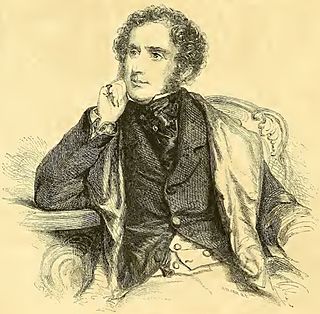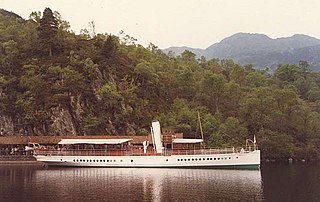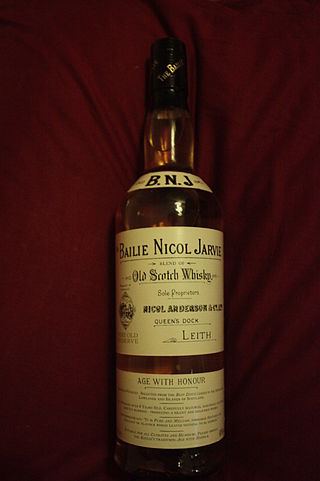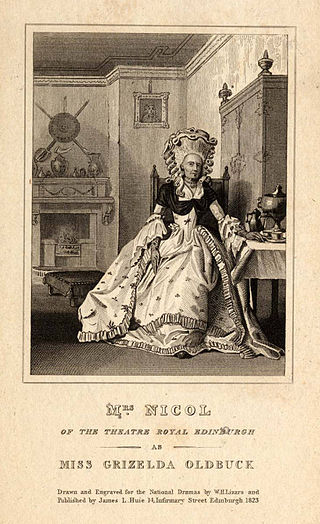Rob Roy usually refers to the Scottish folk hero Rob Roy MacGregor.

Sir Walter Scott, 1st Baronet, was a Scottish historian, novelist, poet, and playwright. Many of his works remain classics of European and Scottish literature, notably the novels Ivanhoe (1819), Rob Roy (1817), Waverley (1814), Old Mortality (1816), The Heart of Mid-Lothian (1818), and The Bride of Lammermoor (1819), along with the narrative poems Marmion (1808) and The Lady of the Lake (1810). He had a major impact on European and American literature.

James William Wallack, commonly referred to as J. W. Wallack, was an Anglo-American actor and manager, born in London, and brother of Henry John Wallack.

Rob Roy (1817) is a historical novel by Walter Scott, one of the Waverley novels. It is probably set in 1715, the year of the second Jacobite rising, and the social and economic background to that event are an important element in the novel, though it is not treated directly. The depiction of Rob Roy bears little relation to the historical figure: "there are two Rob Roys. One lived and breathed. The other is a good story, a lively tale set in the past. Both may be accepted as ‘valid', but they serve different needs and interests."

SS Sir Walter Scott is a small steamship that has provided pleasure cruises and a ferry service on Loch Katrine in the scenic Trossachs of Scotland for more than a century, and is the only surviving screw steamer in regular passenger service in Scotland. She is named after the writer Walter Scott, who set his 1810 poem Lady of the Lake, and his 1818 novel Rob Roy around Loch Katrine.

William Henry Wood Murray (1790–1852), a Scottish actor, manager and theatre owner in Edinburgh, was a friend of Walter Scott and particularly associated with dramatisations of Scott's Waverley Novels.

Bailie Nicol Jarvie was a brand of whisky which was produced by The Glenmorangie Company in Scotland. It was named after a character in Walter Scott's novel Rob Roy. It is a blended Scotch whisky, which has a good following in Scotland, but is relatively unknown in other parts of the world.

North Britain is a term which has been used, particularly between the 17th and 19th centuries, for either the northern part of Great Britain or Scotland, which occupies the northernmost third of the island. "North Britains" could also refer to Britons from Scotland; with North Briton later the standard spelling. Its counterparts were South Britain, generally used to refer to England and Wales and West Britain, usually referring to Ireland.

Charles Fisher was an American stage actor and comedian. Born to a prolific theatrical family from Norfolk, England, Fisher went on to find success as an actor in different parts of England, and then from 1852 onwards in New York City where he worked as a highly regarded performer for almost 40 years in the companies of William E. Burton, Laura Keene, James William Walluck, and Augustin Daly.

Catherine Sinclair was a Scottish novelist and children's writer, who departed from the moralising approach common in that period. She is credited with discovering that the author of the initially anonymous Waverley Novels was Sir Walter Scott.
Isaac Pocock was an English dramatist and painter of portraits and historical subjects. He wrote melodramas, farces and light operatic comedies, many being stage adaptations of existing novels. Of his 40 or so works, the most successful was Hit and Miss (1810), a musical farce. The mariner Sir Isaac Pocock (1751–1810) was his uncle.

Theatre in Scotland refers to the history of the performing arts in Scotland, or those written, acted and produced by Scots. Scottish theatre generally falls into the Western theatre tradition, although many performances and plays have investigated other cultural areas. The main influences are from North America, England, Ireland and from Continental Europe. Scotland's theatrical arts were generally linked to the broader traditions of Scottish and English-language literature and to British and Irish theatre, American literature and theatrical artists. As a result of mass migration, both to and from Scotland, in the modern period, Scottish literature has been introduced to a global audience, and has also created an increasingly multicultural Scottish theatre.

George Soane (1790–1860) was an English writer and dramatist.

Henry Erskine Johnston (1777–1838?) was a Scottish actor given the sobriquet The Edinburgh Roscius. .

Scottish literature in the nineteenth century includes all written and published works in Scotland or by Scottish writers in the period. It includes literature written in English, Scottish Gaelic and Scots in forms including poetry, novels, drama and the short story.
Events from the year 1818 in Scotland.
Events from the year 1824 in Scotland.

Sarah Bezra Nicol was a British actress who became known for playing older women character roles in Edinburgh.
Jessie Fraser later Jessie Ryder then Jessie Pollock was a stage actor, singer and theatre manager based in Aberdeen.

James Prescott Warde (1792–1840) was an English actor. He came up as a provincial tragic actor, in the Garrick mould. The Dictionary of National Biography says he was "full of promise at the time of his first appearance in London", in 1818, but did not reach the top ranks of the profession.















